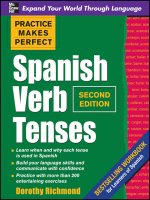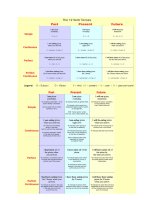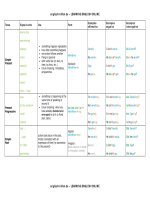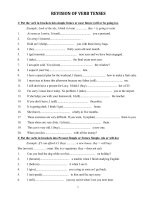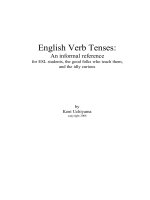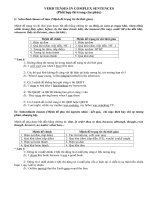USING VERB TENSES
Bạn đang xem bản rút gọn của tài liệu. Xem và tải ngay bản đầy đủ của tài liệu tại đây (433.83 KB, 52 trang )
USING THE RIGHT TIME
Find someone who…..
2
Present Simple or Progressive?
3
Past Tense Simple or Progressive?
8
Present Perfect Simple or Progressive?
19
Past Perfect Simple or Progressive?
27
Future Tense Simple or Progressive / Future Perfect
31
Dreaming the grammar dreams – story
40
All tenses mixed and jumbled
41
1
Find someone who.
chews chewing gums....................................................................................................................
has won a race or a contest ………………………………………...............................................
likes to have very hot baths ………………………………………..............................................
reads more than one book a week ..…………………………………….....................................
talks to plants ………………………………………...................................................................
is trying to break a habit ………………………………………...................................................
was born on a Thursday ………………………………………...................................................
owns a pet with four legs ……………………………………….................................................
has got more than three brothers or sisters ……………………………………….......................
will celebrate his/her birthday next month………………………………………........................
would go to the moon if invited by an astronaut ……………………………………...............
wears socks in bed ……………………………………..............................................................
dreams about flying ……………………………………............................................................
usually goes to bed after midnight …………………………………….....................................
believes in reincarnation ……………………………………....................................................
likes working in the garden ……………………………………...............................................
can tell a joke in English ……………………………………...................................................
saw a scary movie last week ……………………………………...............................................
goes jogging ……………………………………….....................................................................
has seen "Swan Lake" ………………………………………......................................................
likes spring best ……………………………………....................................................................
usually sings in the bath ………………………………………...................................................
can cook a very good meal. ……………………………………..................................................
would like to be 16 years old again …………………………………….....................................
2
SIMPLE PRESENT
a) Water consists of
hydrogen and oxygen.
b) Most animals kill only for
food.
c) The world is round.
d) I study for two hours
every night.
e) My classes begin at nine.
f) He always eats a sandwich
for lunch.
g) I have only a dollar right
now.
h) I don't recognize that man.
i) He needs a pen right now.
The simple present says that
something was true in the
past, it is true in the present,
and will be true in the future.
It is used for general
statements of fact.
The simple present is used to
express habitual or everyday
activity.
Certain verbs are not used in
the progressive tenses. With
these verbs, the simple
present may indicate a
situation that exists right
now, at the moment of
speaking.
PRESENT PROGRESSIVE
j) John is sleeping right now.
k) I need an umbrella because
it is raining.
l) John and Mary are talking
on the phone.
The present progressive expresses an activity that is in
progress at the moment of
speaking. It began in the
recent past, is continuing at
present, and will probably
end at some point in the
future.
m)
I am taking five
courses this semester,
n) John is trying to improve
his work habits.
o) She is writing another
book this year.
Often the activity is of a
general nature: something
generally in progress this
week, this month, this year.
Note (o): The sentence
means that writing a book is
a general activity she is
engaged in at present, but it
does not mean that at the
moment of speaking she is
sitting at her desk with pen in
hand.
3
VERBS USUALLY NOT USED IN ANY OF THE PROGRESSIVE
TENSES
VERB
EXAMPLE
be
(a) I am hungry
SENSES
hear
taste
smell
see
(b) I hear a noise.
(c) This food tastes good.
(d) I smell gas.
(e) I see a butterfly.
MENTAL
ACTIVITY
know
believe
think
understand
recognize
remember
forget
mean
(f) I know his phone number.
(g) I believe his story.
(h) I think he is a kind man. (meaning:
believe)
(i) I understand your problem now.
(j) I don't recognize him.
(k) I remember my first teacher.
(1) I forget his name,
(m) I mean this book, not that one.
POSSESSION
possess
own
have
belong
(n)
(o)
(p)
(q)
He possesses many fine qualities,
She owns a house,
He has a car. (meaning: possesses)
That belongs to me.
ATTITUDES
Want
prefer
need
appreciate
love
like
hate
dislike
seem
r)
s)
t)
u)
v)
w)
x)
y)
z)
I want to leave now.
He prefers to stay here.
I need some help.
I appreciate your help.
I love my family.
I like this book.
She hates dishonesty.
I dislike this book.
He seems to be a nice person.
VERB
ATTITUDES
look
EXAMPLE
She looks cold.
(aa) (meaning: seems to be)
appear
(bb) He appears to be asleep,
(meaning: seems to be)
OTHER USES OF THIS
VERB
You will be hearing from
me. (meaning: I will write or
phone you.
The doctor is seeing a
patient, (meaning: meeting
with)
I am thinking about this
grammar, (meaning: Certain
thoughts are going through
my mind right now.)
I have been meaning to call
you. (meaning: intending)
I am having trouble.
He is having a good time.
(meaning: experiencing)
OTHER USES OF THIS
VERB
I am looking out the window.
(meaning: using my eyes to
see)
The actor is appearing on the
stage.
4
EXERCISE I
Use either the simple present or the present progressive of the verbs in
parentheses.
1. Kathy (sit, usually) _____________________in the front row in class, but today
she (sit) __________________ in the last row.
2. Diane can't come to the phone because she (wash) _________________ her
hair.
3. Diane (wash) __________________________her hair every other day or so.
4. Please be quiet. I (try) _____________________________ to concentrate.
5. (Lock, you, always) ________________________ the door to your apartment
when you leave?
6. Look! It (snow) _______________________________________________.
7. Mike (go, not) __________________________________ to school right now
because it is summer. He (attend) _________________ college from September
to May every year, but in the summer he (have, usually) ____________________
a job at the post office. In fact, he (work) ___________________________ there
this summer.
8. Right now I (look) _________________________ around the classroom.
Ahmed (write) ____________________________ in his book. Carlos (bite)
__________________ his finger nails.
5
5 Detectives at work
Tom and Nick are watching the house across the street. Something strange is
happening.
Put the verbs in brackets in the present simple or the present continuous to make
correct sentences.
TOM What are you staring (you stare) at?
NICK There's a man at the Johnsons' house. He doesn't live (not live) there. I
wonder what he 1________________________________(do)
TOM Perhaps he 2 __________________________ (visit) the Johnsons.
NICK No. They're not at home. They both _______________________(work) in
town. They 4_____________________________ (catch) the same train as Dad
every morning. It's strange. He ______________________(watch) the house very
carefully.
TOM Now he6 _______________________ (try) to open the gate, but it's
locked. Look! He7 ________________________ (climb) over the garden wall. I
can't see him now.
NICK Let's follow him. I want to see what he8 _______________________(do)
TOM He 9 ___________________________(go) to the garage. He 10_________
_____________ (carry) a ladder. Now he 11__________________________(put)
the ladder up to the bedroom window!
NICK He must be a burglar. . . Hey! You!
What 12_______________________(you do)?
MAN It's all right, boys. I'm an insurance
agent. 113____________________________
(examine) the roof. The Johnsons 14______________________ (know) that I'm
here.
6
7
8
SIMPLE PAST
a) I walked to school
yesterday.
b) He lived in Paris for ten
years, but now he is living
in Rome.
c) I bought a new car three
days ago.
The simple past indicates that
an activity or situation began
and ended at a particular
time in the past.
d) I stood under a tree when it
began to rain.
e) When she heard a strange
noise, she got up to
investigate.
f) When I dropped my cup,
the coffee spilled on my
lap.
If a sentence contains when
and has the simple past in
both clauses, the action in the
"when clause" happens first.
In (d): 1st: The rain began.
2nd: I stood under a tree.
PAST PROGRESSIVE
i) I was walking down the
street when it began to rain.
j) While I was walking down
the street, it began to rain.
k) I was standing under a tree
when it began to rain.
In (i): 1st: I was walking down
the street.
2nd: It began to rain.
In other words, both actions
occurred at the same time, but
one action began earlier and
was in progress when the other
l) At eight o'clock last night, I action occurred.
was studying.
In (1): My studying began before 8:00, was in progress at
m) Last year at this time, I was that time, and .probably
attending school.
continued.
n) Last January, while you
were trudging through
snow in Iowa, I was lying
on the beach in Florida.
o) While I was studying in one
room of our apartment, my
roommate was having a
party in the other room.
Sometimes the past
progressive is used in both
parts of a sentence when two
actions are in progress
simultaneously.
p) It rained this morning.
In some cases, the simple past
q) It was raining this morning. and the past progressive give
almost the same meaning, as in
(o) and (p).
9
Exercise 1
Use the simple past or the past progressive in the following.
1. I (read) ____________________________ only two chapters last week.
2. I (read) _________________________ a book last night when you called.
3. I (call) _______________________ John at nine last night, but he (be, not)
__________________ at home. He (study) ____________________________
at the library.
4. I (hear, not) _______________________ the thunder during the storm last night
because I (sleep) _________________________.
5. My brother and sister (argue) _______________________ about something when
I (walk) _________________________ into the room.
6. When I (open) ______________________ the package, I (find) ______________
_________ a surprise.
7. He (climb) ________________________ the stairs when he (trip) _____________
and (fall) _______________________. Luckily, he (hurt, not) __________________
himself.
8. While I (read) ___________________________ the little boy a story, he (fall)
_________________________ asleep, so I (close) __________________________
the book and quietly (tiptoe) __________________________ out of the room.
Exercise 2
How jeans came to America
Put the verbs in brackets in the past simple or past continuous.
Levi Strauss came (come) from a small town in the south of Germany. When he 1.
___________ (be) a young man, he2 __________________ (fall) in love with the
mayor's daughter.
10
But the mayor and Levi's parents 3 _______________________(not want) them to
marry.
Levi's parents 4_____________________ (send) him away to New York where his
brothers 5________________________ (live). They6 ______________________
(be) tailors and they7____________________ (teach) him to sew. In 1850, Levi
_______________________ (take) some sailcloth from New York to San
Francisco when he _________________________ (meet) some men. They
10
_____________________________(dig) for gold in the streams and rivers. The
weather was bad. It ________________________ (rain) and the wind12
_____________________________
(blow). The men were cold because they (wear)13
___________________________thin trousers.
Suddenly Levi 14______________________(have) an idea. He 15 ____________
(use) the sailcloth which he16 _____________________ (transport) to make
trousers for the men. Then he 17___________________________________(sew) on metal studs to
make them stronger.
The men 18 ____________________________ (love) the trousers but they
19________________________________________(not
like) the yellow-grey colour. So when Levi
Strauss 20______________________(open) a tailor's shop in San Francisco, he 21
_______________________ (import) a special thick blue material from Nimes in
France. That's how jeans 22 _________________________(become) blue.
Exercise 3 Where did he come from?
Use the words in brackets to write questions about Levi Strauss. He came from
Germany. (Where ...................from)
'Where did he come from?
11
1 His parents sent him to America. (Where)
________________________________________________________________
2 His brothers taught him to sew. (What)
________________________________________________________________
3 In 1850 he set out for San Francisco. (When)
________________________________________________________________
4 He met some prospectors on the way. (Who)
_________________________________________________________________
5 They were digging in a river. (Where)
_________________________________________________________________
6 They were wearing thin trousers. (What)
_________________________________________________________________
7 He was taking sailcloth to California. (What)
_________________________________________________________________
8 He made trousers from the sailcloth. (What. . from)
_________________________________________________________________
9 The men didn't like the colour. (Why)
________________________________________________________________
10 He imported blue material from France. (Where... from)
_________________________________________________________________
Exercise 4 PAST SIMPLE - PAST CONTINUOUS
1. When she ___________________________the dishes she ________________
a big plate. (dry / drop)
2. While they _________________________ TV, a thief _________________ in.
(watch / climb)
12
3 Mother _________________________ dinner, while we _______________ our
homework. (cook / do)
4. The pupils ________________ cards, when their teacher _________________
(play / enter)
5. Mother _________________ the clothes, when the lights _________________
out (iron / go)
6. The postman ________________ the parcel, just as they _________________
(bring / leave)
7. Susan ________________ her purse, while she _________________________
(lose / shop)
8. We __________________a song, when our headmaster ____________________
(sing / enter)
9. When he ____________________ to town, he __________________________
an accident (drive / have)
10. Mother ______________________ a cake, while we _____________________
in the garden. (bake / play)
11. As I _________________ down the street, a car __________ into the shop.
(walk / crash)
12. While we __________________ TV, a thief _____________ our car.
(watch / steal)
13. The burglar ________________ the safe, when he _________ some footsteps,
(open/hear)
14. Father _______________ the newspaper, when the doorbell ______________.
(read / ring)
13
Exercise 5
PAST SIMPLE - PAST CONTINUOUS (2)
1. We ___________________________________TV last night. (watch)
2. The train ___________________________________ at 6.30. (leave)
3. Mother ____________________________the dishes - (wash) when the phone
_____________________________. (ring)
5. We ________________________________ a nice party last Saturday, (have)
6. In 55 B. C. Julius Caesar _____________________________to Britain. (come)
7. Father ________________________________in his car - (wait) while mother
____________________. (shop)
9. I couldn't come, because I _________________________________ ill. (be)
10. Just as he
___________________________________to bed, (go)
the lights __________________________out. (go)
12. The car suddenly _________________________________________. (stop)
13. It ________________________(rain) when he_____________________ out of
the window. (look)
15. Father ____________________________ home yesterday. (not come)
He ______________________________ lunch in a restaurant. (have)
16. I ________________________________ through the window. (look)
Some students _______________________________ on the blackboard, (write)
17. We _____________________________an English song, (sing) when the door
__________________________ . (open)
18. Mother _______________________________ the rooms last Saturday. (clean)
19. They _____________________ that school, (build) when I _________________
a little boy. (be)
14
20. Some people in the waiting-room __________________________ (read).
Suddenly the door ___________________ (open) and the nurse
________________ (say), "The next one, please”.
21. The dog ________________________________ the postman (attack).
just as he _________________________ letters into the letter-box. (put)
22. How ___________you _____________your leg? (break) I ________________
off the ladder, (fall) when I ________________ some apples. (pick)
23. We ___________________________much sleep last night, (not get) because
our neighbours ________________________________a party . (have)
24. You are late. The train ________________________________ at 8.00. (leave)
25. They _________________________________ to Canada some years ago. (go)
26. I ___________________________ my homework (do) when my friend Peter
____________________. (turn up)
27. They __________________tea (have) when the doorbell __________________ .
(ring)
GRAMMAR WITH LAUGHTER
Past Simple / Continuous
Complete the jokes below by using the correct tense of the verb in brackets:
1. Dad. What do you call a small brown thing with ten legs, and green eyes?
I don't know, son. Why do you ask?
Well, one .......................................... along your lettuce just before you …………........... it!
(crawl, eat)
2. Harry ........................................................ a large grandfather clock on his shoulder, (carry)
He was delivering it to a customer. He couldn't see what was on his right hand side and he
.................................................over an old lady who ............................... in a shop window,
(knock, look) "I'm very, very sorry, "said the man.
"Idiot!" shouted the old woman. "Why can't you wear a watch like everybody else?"
3. What .............................. you …………….......... in my apple tree last night, young man?
(do)
15
Well, one of your apples ................................ down when I ............................ your garden
so I……………………………………......... it back for you! (fall, pass, put)
4. Magic Bob was a magician on a cruise ship. Each night he took objects from the
passengers and made them disappear, then reappear in strange places. The captain of the
ship had a parrot which always shouted "Rubbish!" at the end of the magician's act. One
day the ship ................................... an iceberg and ……………. .......... . (hit, sink) The
magician and the parrot were the only survivors. While they ............................. on a large
piece of wood in the water, the parrot ……………………………............ (lie, say) "OK,
genius. Where's the ship?"
5. A lifeguard ................................................. a young lady the kiss of life when her husband
..................................... (give, arrive).
What are you doing to my wife?
I'm giving her artificial respiration.
Artificial! Give her the real thing. I'll pay for it.
6. Doctor, lots of my hair ........................................... out while I .................................. it this
morning, (fall, brush)
Have you got anything for it?
Sure. Here's a box.
7. A young man was in the middle of a road with his right ear to the ground. An old lady
asked him:
8.
What are you listening for?
A motorbike passed this spot ten minutes ago.
That's incredible! How do you know that?
Because it ................................... me while I ............................. the road and it.................
my neck. (hit, cross, break)
9. How did you get that big red lump on your nose?
I................................a brose while I ............................... in the garden, (smell, work)
But there is no 'b' in rose.
There was in this one!
16
Talk or write about accidents you had, while you were doing something else. For
example: I cut (past simple) my hand badly while I was peeling (past continuous) some
potatoes. I scraped the side of my car while I was parking in town.
UPS & DOWNS
11.
12.
13.
14.
15.
16.
17.
1. swim
2. rise
3. come
4. drink, throw
5. fight
6. keep
7. buy
8. light
9. think
10.find
18.
19.
20.
21.
22.
23.
24.
25.
26.
27.
28.
29.
30.
bite
hear
bring
send
wear
know
draw,
hide
leave
ring
begin
31.
32.
33.
34.
35.
36.
37.
38.
39.
40.
beat
do
take
drive
grow
tell
run
catch
get
cut
41.
42.
43.
44.
45.
46.
47.
48.
49.
50.
lay
teach
have
sell
show
build
let
blow
spend
read
make
shut
sit
hold
win
lose
fall
sing
meet
weep
100
99
98
97
96
95
94
93
92
91
FINISH
81
DOWN
82
83
84
DOWN
85
86
87
88
89
90
80
79
78
77
76
UP
75
74
73
72
71
61
62
63
64
65
66
67
DOWN
68
69
70
60
59
58
57
UP
56
55
54
53
52
51
41
UP
42
43
44
45
46
47
48
UP
49
50
40
49
38
37
36
35
UP
34
33
32
31
21
22
23
24
UP
25
26
27
28
29
30
20
DOWN
19
18
17
16
UP
15
14
13
12
11
2
3
UP
4
5
6
7
UP
8
9
10
1
START
UP
51.
52.
53.
54.
55.
56.
give
eat
lie
shine
wake
write
61.
62.
63.
64.
65.
66.
fly
break
go
forget
say
feel
71.
72.
73.
74.
75.
76.
speak
see
put
be
choose
dig
81.
82.
83.
84.
85.
86.
sleep
forbid
spread
shake, lend
shrink
forgive
91.
92.
93.
94.
95.
96.
tear
spit
spring
spin
undertake
understand
17
57.
58.
59.
60.
feed
freeze,sweep
pay
strike
67.
68.
69.
70.
ride
mean
become
stand
77.
78.
79.
80.
knee
lead
sew
hit
87.
88.
89.
90.
steal
cost, hurt
swing
shoot
97.
98.
99.
swear
stick
sink
Irregular verbs
1.
2.
3.
4.
5.
6.
7.
8.
9.
10.
11.
12.
13.
14.
15.
16.
17.
18.
19.
20.
21.
22.
23.
24.
25.
26.
27.
28.
29.
30.
31.
32.
33.
34.
35.
36.
37.
38.
39.
40.
41.
42.
43.
44.
45.
46.
47.
48.
49.
swim - swam - swum (schwimmen)
rise - rose – risen (erheben)
come - came – come (kommen)
drink - drank – drunk (trinken)
throw - threw – thrown (werfen)
fight - fought – fought (kämpfen)
keep - kept – kept (halten)
buy - bought – bought (kaufen)
light - lit – lit (leuchten)
think - thought – thought (denken)
find - found – found (finden)
bite - bit – bitten (beißen)
hear - heard – heard (hören)
bring - brought – brought (bringen)
send - sent – sent (schicken)
wear - wore – worn (tragen)
know - knew – known (wissen)
draw - drew – drawn (zeichnen)
hide - hid – hidden (verstecken)
leave - left – left (verlassen)
ring - rang – rung (lauten)
begin- began – begun (anfangen)
beat - beat – beaten (schlagen)
do - did – done (tun)
take - took – taken (nehmen)
drive - drove – driven (lenken)
grow - grew – grown (wachsen)
tell - told – told (erzählen)
run - ran – run (rennen)
catch - caught – caught (fangen)
get - got – got (bekommen)
cut - cut – cut (schneiden)
lay - laid – laid (legen)
teach - taught – taught (lehren)
have - had – had (haben)
sell - sold – sold (verkaufen)
show - showed – shown (zeigen)
build - built – built (bauen)
let - let – let (lassen)
blow - blew – blown (blasen)
spend - spent - spent(verbringen)
read - read - read(lesen)
make - made – made (machen)
shut - shut- shut (schließen)
sit - sat – sat (sitzen)
hold - held – held (halten)
win - won – won (gewinnen)
lose - lost – lost (verlieren)
fall - fell – fallen (fallen)
sing - sang – sung (singen)
meet - met – met (treffen)
50.
51.
52.
53.
54.
55.
56.
57.
58.
59.
60.
61.
62.
63.
64.
65.
66.
67.
68.
69.
70.
71.
72.
73.
74.
75.
76.
77.
78.
79.
80.
81.
82.
83.
84.
85.
86.
87.
88.
89.
90.
91.
92.
93.
94.
95.
weep - wept – wept (weinen)
give – gave - given (geben)
eat - ate - eaten (essen)
lie - lay - lain (liegen)
shine - shone - shone (scheinen)
wake - woke - woken (aufwachen)
write - wrote - written (schreiben)
feed - fed - fed (futtern)
freeze - froze - frozen (frieren)
sweep - swept - swept (kehren)
pay - paid - paid (bezahlen)
strike - struck - struck (schlagen)
fly - flew - flown (fliegen)
break - broke - broken (brechen)
go - went - gone (gehen)
forget - forgot - forgotten (vergessen)
say - said - said (sagen)
feel - felt - felt (fühlen)
ride - rode - ridden (reiten)
mean - meant - meant (meinen)
become - became - become (werden)
stand - stood - stood (stehen)
speak - spoke - spoken (sprechen)
see - saw - seen (sehen)
put - put - put (setzen)
be - was/were - been (sein)
choose - chose - chosen (wahlen)
dig - dug - dug (graben)
kneel - knelt - knelt (knien)
lead - led - led (fuhren)
sew - sewed - sewn (nahen)
hit - hit - hit (schlagen)
sleep - slept - slept (schlafen)
forbid - forbade - forbidden
(verbieten)
spread - spread - spread (verbreiten)
shake - shook - shaken (schütteln)
lend - lent - lent (leihen)
shrink - shrank - shrunk (schrumpfen)
forgive - forgave - forgiven (vergeben)
steal - stole - stolen (stehlen)
cost - cost - cost (kosten)
hurt - hurt - hurt (verletzen)
swing - swung - swung (schwingen)
shoot - shot - shot (schießen)
tear - tore - torn (reißen)
spit - spat - spat (spucken)
spring - sprang - sprung (springen)
spin - spun - spun (spinnen)
undertake -undertook -undertaken
(unternehmen)
18
96.
97.
understand - understood - understood
(verstehen)
swear - swore - sworn (schworen)
98.
99.
stick - stuck - stuck (kleben)
sink - sank - sunk (sinken)
19
PRESENT PERFECT
a) They have moved into a
new apartment.
b) Have you ever visited
Mexico?
c) I have already seen that
movie.
d) I have never seen snow.
The present perfect
expresses the idea that
something happened (or
never happened) before
now, at an unspecified time
in the past. The exact time
it happened is not
important.
If there is a specific
mention of time, the simple
past is used: I saw that
movie last night.
e) We have had four tests so The present perfect also exfar this semester.
presses the repetition of an
f) I have written my wife a activity before now. The
letter every other day for exact time of each
the last two weeks.
repetition is not important.
g) I have met many people
since I came here in
June.
h) I have flown on an
airplane many times.
i) I have been here since
seven o'clock.
j) We have been here for two
weeks,
k) I have had this same pair
of shoes for three years.
The present perfect also,
when used with for or since,
expresses a situation that
began in the past and
continues to the present.*
In the examples, notice the
20
l) I have liked cowboy
movies ever since I was a
child,
m) I have known him for
many years.
difference between since and
for:
since + a particular time
for + duration of time
The present perfect has this meaning primarily for those verbs that are usually not used in any
of the progressive tenses. This meaning is exactly the same as the meaning of the present
perfect progressive tense.
21
PRESENT PERFECT PROGRESSIVE
Right now I am sitting at my
desk.
(a) I have been sitting here since
seven o'clock.
(b) I have been sitting here for
two hours.
(c) You have been studying for
five straight hours. Why don't
you take a break?
(d) He has been watching
television since nine o'clock this
morning.
(e) It has been raining all day. It
is still raining right now.
This tense is used to
indicate the duration of an
activity that began in the
past and continues to the
present. When the tense
has this meaning, it is used
with time words such as
for, since, all morning, all
day, all week.
f) I have been thinking about
changing my major.
g) All of the students have been
studying hard.
h) John has been doing a lot of
work on his thesis. He should
be finished by May.
i) My back hurts, so I have been
sleeping on the floor lately.
The bed is too soft.
When the tense is used
without any specific
mention of time, it
expresses a general
activity in progress
recently, lately.
j) I have lived here since 1975.
k) I have been living here since
1975.
l) He has worked at the same
store for ten years.
With certain verbs (most
notably live, work, teach)
there is little or no
difference in meaning
between the two tenses
when since or for is used.
22
Exercise 1:
Use the simple past or the present perfect. In some sentences either tense is possible but the
meaning is different.
1. I (not attend) ________________________________ any parties since I came here.
2. I (go) ________________to a party at Sally's apartment last Saturday night.
3. Bill (arrive) ____________________________here three days ago.
4. Bill (be) _______________________________________here since the 22nd.
5. Try not to be absent from class again for the rest of the term. You (miss, already)
_______________________________ too many classes. You (miss)
__________________________________ two classes just last week.
6. Last January, I (see) ____________________ snow for the first time in my life.
7. In her whole lifetime, she (see, never) ______________________snow.
8. I (know) _______________________________ Greg Adams for ten years.
9. So far this week, I (have) _________________________ two tests and a quiz.
10. Up to now, Professor Williams (give) ________________ our class five tests.
11. The science of medicine (advance) _________________ a great deal in the 19th century.
12. Since the beginning of the 20th century, medical scientists (make)
____________________ many important discoveries.
Exercise 2:
Use the present perfect progressive in the following.
1. The boys are playing soccer right now. They (play) have been playing for almost two
hours. They must be getting tired.
2. Alex is talking on the phone. He (talk) _________________on the phone for over a half
an hour. He should hang up soon. Long distance is expensive.
3. I'm trying to study. I (try) __________________to study for the last hour, but something
always seems to interrupt met I think I'd better go to the library.
23
Complete the following by writing two sentences. Use the present perfect progressive in the
first sentence; then make another sentence that might typically follow in this situation.
4. The baby is crying. She Has been crying for almost ten minutes.
I wonder what's wrong.
5. It's raining. It ______________________________________________________________
___________________________________________________________________________
6. I'm studying. I _____________________________________________________________
___________________________________________________________________________
7. I'm waiting for my friend. I ___________________________________________________
___________________________________________________________________________
8. Bob is sitting in the waiting room. He __________________________________________
___________________________________________________________________________
Exercise 3:
Use the present perfect or the present perfect progressive. In some sentences, either tense
may be used with little or no change in meaning.
1. It (snow) ___________________________all day. I wonder when it stops.
2. We (have) __________________three major snowstorms so far this winter. I wonder how
many more we will have.
3. It's ten p.m. I ______________________(study) for two hours and probably won't finish
until midnight.
4. I (write) ______________________ them three times, but I still haven't received a reply.
5. I (live) ______________________ here since last March.
6. The telephone (ring) _______________________ four times in the last hour, and each time
it has been for my roommate.
24
7. The telephone (ring) ____________________ for almost a minute. Why doesn't someone
answer it?
8. The little boy is dirty from head to foot because he (play) ____________ in the mud.
Exercise 4:
Same as the preceding exercise.
1. A: (Be, you) ________________ able to reach Bob on the phone yet? B: Not yet. I
(try)________________for the last twenty minutes, but the line (be) __________busy.
2. A: Hi, Jenny. I (see, not) _______________you for weeks. What (do, you)
_________________________ lately? B: Studying.
3. A: What are you going to order for dinner?
B: Well, I (have, never) _______________pizza, so I think I'll order that.
4. A: What's the matter? Your eyes are red and puffy. (Cry, you)______________________?
B: No. I just finished peeling some onions.
4. A: Dr. Jones is a good teacher. How long (be, he) _______________at the university?
B: He (teach) ____________________here for twenty-five years.
Exercise 5: What have they been doing?
Complete the sentences with the present perfect simple or the present perfect continuous.
Jane has been writing (write) a letter to a magazine. She hasn't finished it yet.
1. Ben _____________________(look) for his pen-knife, but he hasn't found it yet.
2. Jenny ___________________ (wait) for the bus for half an hour, but it hasn't arrived yet.
3. Nick _________________ (play) a computer game for two hours and he's still playing.
4. Mike hasn't finished painting his car yet. He __________________ (work) on it for two
weeks.
5. Amanda _________________(not come) home yet. She has been shopping in town since
10 o'clock.
25
